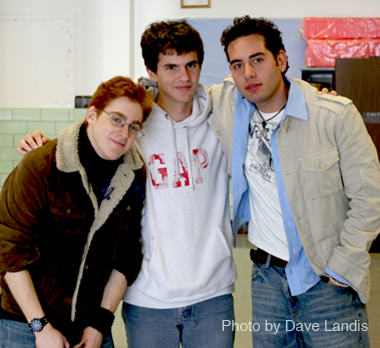Emily Derstine, Plains
emily.derstine@emu.edu

Upon arriving in Alexandria, Virginia, to begin my Ministry Inquiry Program internship with Nueva Esperanza/New Hope Fellowship, I didn’t know what to expect. My response to family and friends, after telling them about my summer was, “I don’t know what it’ll be like but here we go!†Although a bit apprehensive and unsure, I was ready to begin this new experience in a new place, doing something different from anything I had done before.
I visited Nueva Esperanza/New Hope Fellowship (where I would be working) once previously, and had talked a bit with Pastor Kirk Hanger, but in no way could I grasp in one visit what this internship would hold. Nueva Esperanza/New Hope Fellowship is a recent church plant in suburban Washington, D.C. The small, multi-ethnic congregation has a vibrancy and authenticity that draws people. Meeting in a school, the church relies heavily on the help and work of the congregation each Sunday, assisting in setting up and taking down chairs, sound equipment, and the ever-present coffee. Every member of the church pitches in—and is largely expected—to help, or at least to offer conversation, and they complete the tasks together, in community.
Growing up in a predominately Caucasian, middle class church in the suburbs, I wanted a different kind of church experience. I wanted to experience a diverse, urban congregation. I wanted to find out how other people did church, and to participate in the work that they are doing. I chose Nueva Esperanza/New Hope not only to get a greater idea of what pastoral ministry is like, but also to engage and to share in the ministry of another congregation, one that is drastically different from what I’m used to, and maybe even a little bit uncomfortable at times. Ministry, and my work at New Hope, is about taking risks and sailing out upon unknown waters.
Nueva Esperanza/New Hope Fellowship has many Latino attendees, enough to make translating the service into Spanish a priority. Visiting Hispanic church members who speak very little English has urged me to use my rusty, fairly conversational Spanish immediately, despite being a bit intimidated by the rapid conversation surrounding me and directed at me. A definite hope is to improve my Spanish this summer, a seemingly attainable—although potentially uncomfortable—goal for the circumstances.
What strikes me about Nueva Esperanza/New Hope is how real everyone seems. Every person present is just who they are and does not have to pretend in order to be accepted. What goes for the building goes for those inside it, too: it doesn’t have to be pretty or flawless or something it’s not. That’s not what church is. Church is about being real: being real to yourself, being real to others, being real with God and not needing to hide that. Everyone who is there wants to be there; they are committed to the church. The church doesn’t necessarily need committees; people volunteer because they want to help.
Nueva Esperanza/New Hope is outwardly focused, wanting to reach out, to assist the community, and to draw people to itself and to God. There is a certain excitement radiating from the worship and smiling faces present in the room on a Sunday morning.
Relationships are really what connect the congregation and bring it to life. The diversity present unites, instead of separating the church. The leisurely pace of gathering and time spent in conversation is refreshing. Upon entering a household, we are immediately invited to sit down, to talk and enjoy a drink, even if showing up unannounced and only intending to stay a few minutes. Amidst the whirlwind of activity around us, no project is more important than stopping to talk with a neighbor or a friend. I see God in the interactions between people and the way in which the church members relate with me and each other.
 I look forward to the vast array of experiences that await me at New Hope. I hope to form meaningful relationships with people and listen to the stories of others, learning from those around me. I anticipate that the new setting will give me new ideas, new energy, and a renewed hope for what the Mennonite Church is and will become. I look forward to this opportunity as I explore further what it means to be part of the Anabaptist/Mennonite church and take part in God’s exciting work in the world.
I look forward to the vast array of experiences that await me at New Hope. I hope to form meaningful relationships with people and listen to the stories of others, learning from those around me. I anticipate that the new setting will give me new ideas, new energy, and a renewed hope for what the Mennonite Church is and will become. I look forward to this opportunity as I explore further what it means to be part of the Anabaptist/Mennonite church and take part in God’s exciting work in the world.
Young adults attendees from Nueva Esperanza/New Hope: (l to r) Matt Dunton, Jacob Hanger, and Rudy Boliviano.
The opinions expressed in articles posted on Mosaic’s website are those of the author and may not reflect the official policy of Mosaic Conference. Mosaic is a large conference, crossing ethnicities, geographies, generations, theologies, and politics. Each person can only speak for themselves; no one can represent “the conference.” May God give us the grace to hear what the Spirit is speaking to us through people with whom we disagree and the humility and courage to love one another even when those disagreements can’t be bridged.
